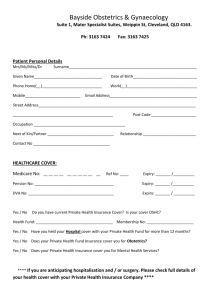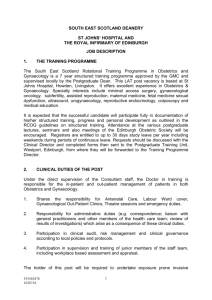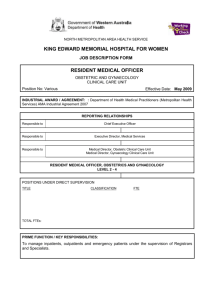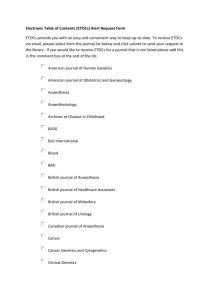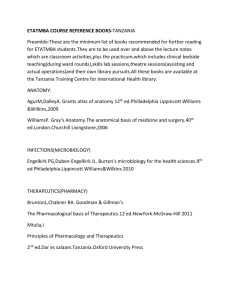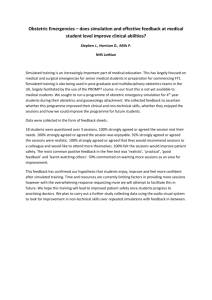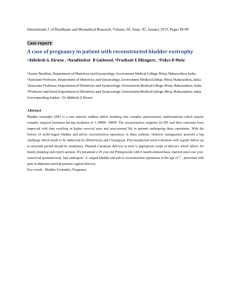the whittington campus
advertisement
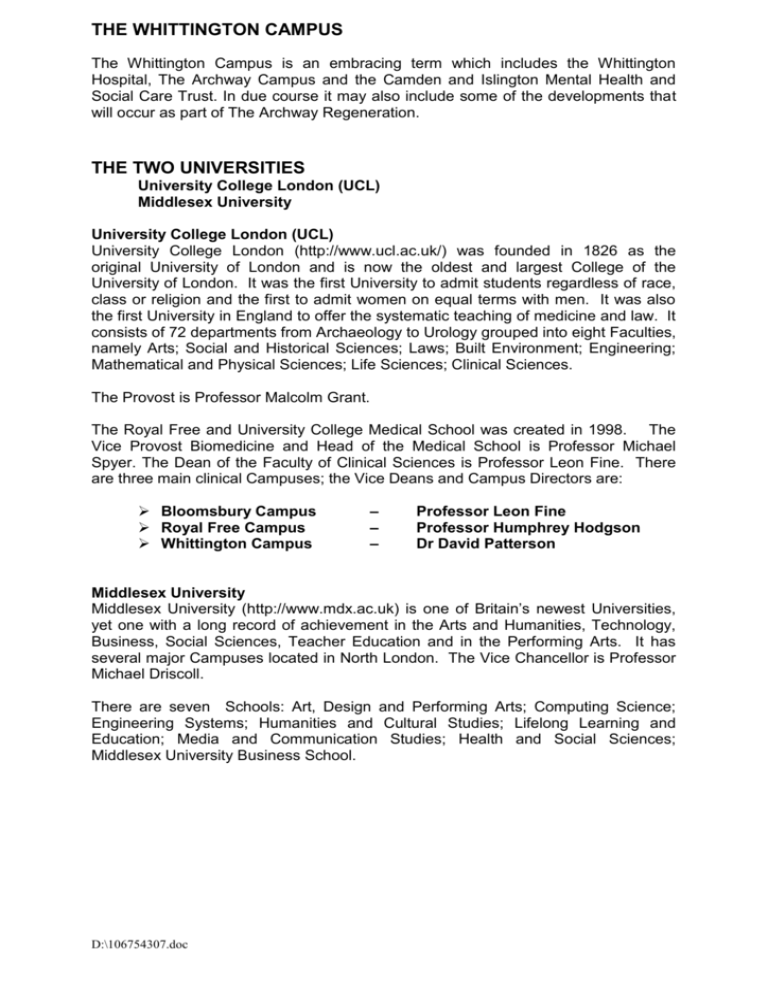
THE WHITTINGTON CAMPUS The Whittington Campus is an embracing term which includes the Whittington Hospital, The Archway Campus and the Camden and Islington Mental Health and Social Care Trust. In due course it may also include some of the developments that will occur as part of The Archway Regeneration. THE TWO UNIVERSITIES University College London (UCL) Middlesex University University College London (UCL) University College London (http://www.ucl.ac.uk/) was founded in 1826 as the original University of London and is now the oldest and largest College of the University of London. It was the first University to admit students regardless of race, class or religion and the first to admit women on equal terms with men. It was also the first University in England to offer the systematic teaching of medicine and law. It consists of 72 departments from Archaeology to Urology grouped into eight Faculties, namely Arts; Social and Historical Sciences; Laws; Built Environment; Engineering; Mathematical and Physical Sciences; Life Sciences; Clinical Sciences. The Provost is Professor Malcolm Grant. The Royal Free and University College Medical School was created in 1998. The Vice Provost Biomedicine and Head of the Medical School is Professor Michael Spyer. The Dean of the Faculty of Clinical Sciences is Professor Leon Fine. There are three main clinical Campuses; the Vice Deans and Campus Directors are: Bloomsbury Campus Royal Free Campus Whittington Campus – – – Professor Leon Fine Professor Humphrey Hodgson Dr David Patterson Middlesex University Middlesex University (http://www.mdx.ac.uk) is one of Britain’s newest Universities, yet one with a long record of achievement in the Arts and Humanities, Technology, Business, Social Sciences, Teacher Education and in the Performing Arts. It has several major Campuses located in North London. The Vice Chancellor is Professor Michael Driscoll. There are seven Schools: Art, Design and Performing Arts; Computing Science; Engineering Systems; Humanities and Cultural Studies; Lifelong Learning and Education; Media and Communication Studies; Health and Social Sciences; Middlesex University Business School. D:\106754307.doc The Archway Campus The Archway Campus (http://www.archway.ac.uk) was jointly purchased by UCL and Middlesex University in 1998. It is being developed as a research and educational facility. It is also a resource for clinicians in Primary Care and other community based professional staff as well as for the local community. Middlesex University at The Whittington Campus The School of Health and Social Sciences offers a wide range of education and training for nurses, midwives and professions allied to medicine from Diploma to Degree at Masters level. It provides pre and post registration education and training for over ten NHS Trusts within Central and North London. The Dean is Professor Margaret House. UCL at The Whittington Campus The two main activities relate to Education and Research. EDUCATION (a) Undergraduate For several decades the Whittington has taught undergraduate medical students in the first two clinical years. It has always been highly regarded for the educational experience it offers. We are now teaching over 200 students on this Campus. The new undergraduate medical curriculum has been introduced. It is a six year course with an intercalated BSc for all non-graduates. It has several characteristics: A modular core curriculum Vertical and horizontal integration Radical changes in assessment Radical changes in skills teaching and assessment D:\106754307.doc There is a particular emphasis on non-medical Special Study Modules; Communication Skills; Ethics and Evidence-Based Medicine. There is an increasing proportion of teaching in the community. There will be a particular emphasis on the inculcation of appropriate attitudes to medical practice together with a seamless progression from the Final Year (Phase 3) through to House Officer posts and Registration. The Whittington Campus is now delivering an increasing proportion of the Curriculum. Students on this Campus for Phase 2 will receive their pathologies teaching here as well as the clinical components. A programme of Teaching the Clinical Teachers is being introduced in order to ensure a high quality of education. This comprises: Intensive introductory teacher training course that all staff teaching medical students will need to take A three year accreditation programme which medical teachers will be encouraged but not compelled to take An MSc in Medical Education for people who are academically interested in education (b) Postgraduate There is a programme of UCL MSc courses. These include: Clinical Risk Management Health Informatics Web based programme in Primary Care Sports and Exercise Medicine Musculoskeletal physiotherapy and osteopathy Cardiorespiratory physiotherapy Other planned MSc courses include: MSc in Medical Education A joint UCL/Middlesex University programme of BSc’s and MSc’s in Human Health and Performance There are between 150 - 180 full and part-time UCL MSc students based here. RESEARCH The UCL academic strategy on The Whittington Campus is to develop a research programme that is complementary to the other UCL Campuses as well as to Primary Care. The intent is to develop appropriately supported research activities under the headings of: Clinical; Biomedical and Laboratory; Health Services; Educational; Informatics; Bioengineering. D:\106754307.doc DEPARTMENTS AND RESOURCES Department of Medicine (http://www.ucl.ac.uk/medicine). The Department of Medicine embraces the three main clinical Campuses. Its Head of Department is Professor Patrick Vallance. The head of the Department of Medicine on the Whittington Campus is Professor James Malone-Lee. Contained within the Department of Medicine on The Archway Campus are the following: Incontinence Science Centre Academic Podiatry Disability Sciences Centre for International Health and Medical Education led by Professor John Yudkin The Department of Surgery (http://ucl.ac.uk/surgery) Professor Irving Taylor and Professor Marc Winslet are joint Heads of the Medical School’s Department of Surgery. Mr Majid Hashemi is Senior Lecturer and Heads the Department at the Whittington Campus. The Department of Obstetrics and Gynaecology Professor Charles Rodeck and Professor Allan MacLean are The joint Head of Department. Professor Albert Singer holds the Chair of Gynaecological Research sited at The Whittington. UCL Centre for Health Informatics and Multiprofessional Education (CHIME) (http://www.chime.ucl.ac.uk/). CHIME was established on The Archway Campus in 1995. It’s Director is Professor David Ingram, Professor of Health Informatics. There are several elements within the Centre: Health Informatics Health Service Development (led by Professor Paul Bate) Open Learning Unit led by Professor Trisha Greenhalgh (Joint with Primary Care) Academic Centre of Medical Education (http://www.ucl.ac.uk/acme/) The Academic Centre of Medical Education was established to co-ordinate developments in teaching and education at undergraduate and postgraduate levels. The main focus of ACME will be in the support of developments and innovations until they are embedded in the curriculum. The Department of Primary Care and Populations Studies (http://www.pcps.ucl.ac.uk) is sited at each of the Clinical Campuses. The Head of Department is Professor Ann Johnson. There are several elements within the Department: The Cardiovascular Unit Community Genetics: a WHO Collaborating Centre led by Professor Bernadette Modell HIV Unit North Central Thames Primary Care Research Network (NoCTEN) Centre for Infectious Disease Epidemiology Co-host to the MRC’s General Practice Research Framework (GPRF) The Centre for Medical Humanities ((http://www.pcps.ucl.ac.uk/cmh). The Department of Psychiatry and Behavioural Sciences (http://www.ucl.ac.uk/psychiatry/). Professor Paul Bebbington holds the Chair of Community and Social Psychiatry and is based at the Archway Campus. D:\106754307.doc FACILITIES on the CAMPUS INCLUDE: The Undergraduate Centre in the Great Northern Building consists of a 95 seated lecture theatre, seminar room, computer cluster room and common room for the use of undergraduates. A new Centre will open in 2004. This will comprise a 150 seated lecture theatre, 2 large seminar rooms, a computer cluster room, a student common room and accomodation for the Deanery staff multidisciplinary venture between UCL and Middlesex University. It provides a positive environment which actively fosters multidisciplinary learning, research and educational innovation. The Archway Healthcare Library (http://www.archway.ac.uk/AHL) is part of a coordinated and integrated Information, Library and Media Services appropriate to changing healthcare environment serving the needs of students, researchers, educationalists, health service staff wherever sited, together with the needs of patient or client. The Postgraduate Centre at the Whittington Hospital is particularly renowned for its Postgraduate Medical Courses. It moved into purpose designed premises on the Archway Campus in 1999. It contains a 110 seated lecture theatre, four seminar rooms and a colposcopy/endoscopic surgery training centre. Social facilities for students and staff are being developed on The Archway Campus. The catering facility (The HUB) opened in 2003. A centralised facility seminar and lecture theatre, booking system has been introduced in order to optimise the efficient use of the learning resources. A new UCL teaching cluster room opened in 2002 in the Furnival Building; this is adjacent to a Middlesex University PC teaching facility ADMINISTRATION The UCL administration at the Whittington Campus consists of: Dr David Patterson Vice Dean and Campus Director Ms Heulwen Morgan Undergraduate Sub-Dean and Site Tutor Ms Martina Yanga Senior Administrator THE WHITTINGTON HOSPITAL NHS TRUST SENIOR HOUSE OFFICER IN OBSTETRICS AND GYNAECOLOGY D:\106754307.doc 1) THE WHITTINGTON HOSPITAL The Whittington is a medium sized district general and teaching hospital. The site contains a mixture of modern purpose built accommodation, plus older Victorian buildings that are in need of replacement, and this is being addressed by a capital development that is currently underway. We are located on Highgate Hill in North London, and serve the populations of North Islington and West Haringey. Our catchment population is around 240,000, and is comprised of a diverse mix in terms of social class, economic status and ethnicity. We serve wealthy communities in Highgate, Finchley and parts of Islington, and also the socially deprived communities of Archway, Holloway, Haringey and other parts of Islington. All main branches of medicine and surgery are provided by the Trust with the exception of cardiothoracic and neurosurgery. Plastics and ophthalmology are provided as outpatients only. We have close working relationships with the tertiary centres at University College London Hospitals, and the Royal Free. A combined Diagnostic and Outpatient block is situated at the entrance to the hospital. This houses the recently upgraded A&E Department together with the main supporting services of Imaging (including MRI), Pathology, Pharmacy and the outpatient suite. A 7 bedded adult general ITU/HDU is located adjacent to the 6 bedded CCU. Both units are well equipped and staffed with dedicated experienced staff. Obstetrics and Gynaecology is based within the Directorate of Surgery and Women’s and Children’s Services, managed by its Director of Operations, Tara Donnelly. Dr Norman Parker is the Trust’s Medical Director. Dr Jane Young, a Consultant Radiologist, is the Trust’s Director of Medical Education and Ms Deborah Wheeler is the Director of R&D. Approximate Bed Numbers Surgery 123 Medical 201 Orthopaedic 56 Gynaecological 19 Maternity 47 Paediatrics 23 (8 are day care) Neonatal Unit 16 (6 intensive care cots) Day beds 22 A&E 4 Critical Care 11 (7 ITU) All figures are approximate as beds are used flexibly, and because ongoing strategic planning processes may affect individual specialty provision from time to time. 2) THE DEPARTMENT THE CITY OF LONDON MATERNITY UNIT D:\106754307.doc In 2001 there were 3140 deliveries of which 93 were home births. The obstetric work-load is shared between 8 Consultants, Miss Frederick Eben, Miss Gaye Henson, Miss Claire Mellon, Miss Amma Kyei-Mensah, Miss Heulwen Morgan, Miss Carolyn Paul, Mr Marcus Setchell and Mr Clive Spence-Jones. Miss Gaye Henson is responsible for the day-to-day management of the Labour Ward. There is an obstetric specialist registrar, senior house officer and anaesthetic specialist registrar on-call for the Labour ward 24 hours a day. NEONATAL PAEDIATRICS The Obstetric Service is supported by the Level 2 Neonatal Unit of 16 cots, 6 being intensive care cots. There are weekly obstetric/paediatric meetings to discuss current antenatal problems, their future management, and neonatal progress. A specific topic is discussed at each meeting. There are in-utero transfers to the unit from other hospitals. There are currently five consultant paediatricans at the Whittington with Dr Broadhurst and Dr Blumberg being the lead neonatologists. OBSTETRIC ANAESTHETIC SERVICE Dr Makinde is the Consultant-in-Charge of the Obstetric Anaesthetic Service, and Registrar level cover is provided for the Labour Ward at all times, this Anaesthetic Registrar having no other duties. There are dedicated Consultant Anaesthetic labour ward sessions. ANTENATAL CLINIC There are daily combined booking and follow-up antenatal clinics. There are joint medical clinics and a large diabetic clinic. There are also midwife-led antenatal clinics. There is a Parenthood Education Programme. There is a Health Advocacy Team providing a translation service in many languages. GYNAECOLOGY The gynaecology workload including on-call will be undertaken by 8 Consultants in the Department. There is one gynaecology ward consisting of 19 beds for both elective and emergency admissions. There are daily main theatre sessions. A large proportion of the surgical work is undertaken in the Day Surgery Unit. Early pregnancy problems are managed in the Early Pregnancy Day Unit and there is a busy Emergency Gynaecology Service. The Whittington Hospital has been designated as a gynaecological cancer unit with University College Hospital as the centre. As such it undertakes the confirmation of suspected gynaecological cancer in patients who have symptoms and tests suggestive of cancer who have been referred from General Practitioners. SPECIAL INTEREST CLINICS Colposcopy Combined Oncology Gynae-endocrine Vulval D:\106754307.doc Menorrhagia Hysteroscopy Fertility including I.U.I. procedures Pregnancy Advice Psycho-Sexual Termination of Pregnancy Gynae-urology Andrology Menopause Obstetric diabetic clinic Obstetric medical clinic SEXUAL HEALTH CLINIC There is a busy Sexual Health Clinic and there are close links with the gynaecology and obstetrics department. ULTRASOUND There are consultant ultrasound sessions where anomaly scans and amniocentesis are undertaken and Miss Paul has responsibility for Fetal Medicine within the unit. Ovarian scanning is also performed. There are weekly meetings with the ultrasonographers. VULVAL CLINIC The vulval clinic was established 15 years ago and the late Dr Marjorie Ridley, a world renowned vulval dermatologist attended the clinic for 10 years.The clinic is currently under the direction of Miss Freeman-Wang. Patients are referred with a variety of benign and malignant conditions. COLPOSCOPY CLINIC Professor Albert Singer and Miss Freeman-Wang are co-directors of the Colposcopy service which, for the last 21 years, has had a busy clinical workload as well as having a strong research and teaching programme. Professor Singer is Professor of Gynaecological Research on the Whittington site and is Senior Research Director of the Colposcopy Unit and Miss Freeman-Wang is the Clinical Director of the Colposcopy Unit. Teaching has been a prime interest and four colposcopy courses, both basic and advanced, are conducted each year with candidates from home and abroad. The appointee will be expected to take part in the organisation and running of these courses. Patients are referred to clinics either with abnormal smears or suspicion of clinical cervical cancer. In 2000 there were 1793 new referrals, 2250 follow-up visits and 368 outpatient treatment visits. Treatment is conducted in the outpatient department in D:\106754307.doc over 90% of cases of cervical pre-cancer. There is an operating list on a regular basis for those unsuitable for outpatient treatment. There are close links with the Cytology Department and regular meetings with the cytologist. 3) CURRENT STAFFING Consultants Mr Trevor P Dutt, FRCOG 6 Sessions (Gynaecology) Miss Friedericke Eben, MRCOG Part-time - 7 Sessions (Obstetrics & Gynaecology) Miss Theresa Freeman-Wang MRCOG Whole-time (Gynaecology only) Miss Gaye Henson, MD FRCOG Whole-time (Obstetrics only) Miss Amma Kyei-Mensah MRCOG MRCP Gynaecology) Whole time - (Obstetrics and Miss Claire Mellon MRCOG Whole-time - (Obstetrics and Gynaecology) Miss Heulwen Morgan, FRCOG Maximum Part-time 5 sessions & 5 Academic Sessions/Royal Free and University College Hospital Medical School (Obstetrics & Gynaecology) Mr N Pisal MRCOG Consultant Obstetrician and Gynaecologist Whole time Miss C Paul MRCOG Consultant Obstetrician Whole-time Prof G Prelevic MD FRCP Menopause and Reproductive Endocrinology 3 sessions Mr M Setchell FRCS FRCOG Consultant Obstetrician and Gynaecologist 8 sessions College Tutor Prof. Albert Singer, D Phil FRCOG 6 sessions (Gynaecology) Mr Clive Spence-Jones, FRCS, FRCOG Maximum Part-time (Obstetrics and Gynaecology) Prof M de Swiet FRCP Obstetric Physician 2 sessions D:\106754307.doc Junior Staff 5 Specialist Registrars 2 Senior SHO Research Fellows 3 Trust Doctor Registrar grade 8 Senior House Officers 17 Clinical Assistant sessions EDUCATION & TRAINING The Whittington Hospital is a main University Hospital of the University of London. It provides undergraduate teaching in association with the University College London Medical School. There are 110 whole time equivalent under-graduates on site at any one time. The final stage of the amalgamation of UCL Medical School with that of the Royal Free will be completed in autumn of 1998. The new joint medical school will have at least 400 students per year with a new vertically integrated curriculum. The appointee will be expected to participate in teaching and supervision of junior staff at the Whittington. POST GRADUATE TRAINING Postgraduate training has a very high profile within the department There are: Weekly half day postgraduate teaching sessions (including Registrar and SHO presentations, clinico-pathology discussions and outside speakers) Monthly Perinatal Mortality and Morbidity Meeting Weekly Perinatal Meetings Weekly Junior Staff CTG and labour ward management teaching sessions Weekly SHO teaching sessions Weekly Ultrasound Meetings Monthly combined oncology meetings Monthly training and audit departmental meetings UNDERGRADUATE TEACHING D:\106754307.doc Miss Morgan organises the teaching programme for the Obstetric and Gynaecology medical students. There are currently 100 students per year from the Royal Free University College Medical School. 4) DUTIES OF THE POST There are currently 8 SHO posts who work a full shift pattern. Three SHO posts are part of a one year rotation with the Royal Free Hampstead NHS Trust, one post is part of the GPVTS scheme, and two posts are 6 months combined obstetrics and gynaecology. One post is for 18 months comprising 6 months Obstetrics and Gynaecology followed by 6 months in Neonatology followed by a further 6 months in Obstetrics and Gynaecology and one post is a Trust Doctor (SHO grade) which is 6 months combined obstetrics and gynaecology. There is excellent labour ward experience, antenatal and postnatal ward experience and antenatal clinic work. Gynaecology experience includes emergency and elective gynaecology work, operating theatre experience, attendance at Specialist gynaecological clinics and working under supervision in the Early Pregnancy Diagnostic Unit. There is a full shift system for on-call. Annual leave is taken in blocks and is fixed prior to commencement of the post. The educational content of the posts is excellent. All post holders are expected to work as part of the Consultant teams and to work closely with other professionals. 5) TERMS AND CONDITIONS OF SERVICE This post is covered by the Terms and Conditions of Service of The Whittington Hospital NHS Trust and in particular to the pay and conditions of service relating to the Hospital Medical and dental Staff Group. LENGTH OF APPOINTMENTS:All appointments are for 6 months (apart from the one year rotations) commencing on 4th August 2004 to 1 February 2005. SALARY SCALE The salary scale £23,940 - £33,570 per annum plus London Weighting allowance of £2,047. HOURS OF WORK The hours of duty are the standard working week of 40 hours and that in additions the holder of the post will be available for not more that 16 ADHs at Class 1 rate on average each week, subject to change. The additional duty hours of these posts will continue to be under review in compliance with the junior Doctor’s Hours initiative. D:\106754307.doc You should be prepared to perform duties in occasional emergencies and unforeseen circumstances. Commitments arising in such circumstances are, however, exceptional and you will not be required to undertake work of this kind for prolonged periods or on a regular basis. All efforts will be made to ensure that work of this kind does not result in continuous hours of duty, which exceed the New Deal continuous hours of duty limits. LEAVE Leave is taken in blocks which are arranged prior to starting the post. You are required to take all of your leave by the end of your appointment. Any Bank Holidays worked for which provision has not been made in the rota during the 6 months tenure of this appointment will be covered by payment in lieu. STUDY LEAVE Doctors wishing to take study leave should apply to the Academic Centre at least 6 Weeks before Study Leave is required. This also applies to those wishing to take Study Leave soon after taking up the post. Any Bank Holidays worked for which provision has not been made in the rota during the 6 months tenure of this appointment, will be covered by payment in lieu. ACCOMMODATION This post is non-resident. You will be required to demonstrate appropriate training in the core of knowledge required in the Schedule to the Ionising Radiation (Protection of persons undergoing medical examination or treatment) Regulations 1988. ROYAL FREE HAMPSTEAD NHS TRUST and the WHITTINGTON HOSPITAL NHS TRUST ROTATING SENIOR HOUSE OFFICER POSTS IN OBSTETRICS & GYNAECOLOGY D:\106754307.doc JOB DESCRIPTION The Royal Free Hampstead NHS Trust post General Information - History The Royal Free Hospital, Pond Street, Hampstead, London NW3 is one of London's leading teaching hospitals. The hospital, later to be joined by the Medical School, moved to its present location in 1974, bringing together several hospitals onto one site - the old Royal Free Hospital in Gray's Inn Road, and the Lawn Road, New End and Hampstead General Hospitals. The aim of the new hospital was to provide accessible and high quality services, both for the local community and for patients from further afield. The Free Hospital was founded by William Marsden in 1828 to provide free hospital care for those who could not afford treatment. In 1832, when every other hospital denied access to the victims of cholera, the Free opened its doors to patients. In recognition of this, Queen Victoria commanded in 1837 that the hospital should be called the Royal Free Hospital. More than one hundred years ago The Royal Free was the only London hospital to offer facilities for clinical instruction to female students of medicine. So the hospital began its close and important association with the London School of Medicine for Women, later to become the Royal Free Hospital School of Medicine. The Royal Free Hampstead NHS Trust came into being as a first-wave Trust in 1991. The main site is the Royal Free Hospital, a fifteen storey tower block in Hampstead. The Trust also includes the Royal National Throat, Nose and Ear Hospital (RNTNE); Queen Mary's (providing rehabilitation and continuing care for elderly people) in Hampstead; and a number of community facilities including comprehensive child health. The Royal Free Hospital is a major accident centre, and provides all the major branches of medicine, surgery and obstetrics care. Noted specialist units include liver medicine and transplantation, renal services (including transplantation), haematology (including haemophilia and bone marrow transplantation), oncology, neurosciences, paediatric gastroenterology, infectious diseases and HIV/AIDS, connective tissue medicine and plastic surgery. The Trust’s catchment area for services for elderly people and emergency services comprises Hampstead and south Barnet. A range of out-patient and day surgery services are provided by the Royal Free at Edgware and Barnet Hospitals with associated in-patient referrals to the Royal Free or to the RNTNE Hospital. The Royal Free and University College Medical School of University College London has an annual intake of 330 students and accepts an additional 55 Oxbridge students for clinical training. The Royal Free campus provides clinical training for approximately 140 students in each clinical year and staff also contribute to the Phase 1 (Life Science) course. There are established University Clinical Departments of Medicine, Surgery, Clinical Neurosciences, Obstetrics and Gynaecology, Psychiatry, Haematology, Histopathology, Medical Microbiology, Virology, Chemical Pathology, Immunology, Public Health, General Practice, Retrovirology, Travel Medicine and Vaccines, Oncology, Health Services for Elderly People, Child and Family Mental Health, Paediatric Gastroenterology and Community Child Health. D:\106754307.doc Organisation (Royal Free Hampstead NHS Trust) Direct NHS patient care services are managed by four divisions (Gray’s Inn, Lawn Road, Liverpool Road and RNTNE). Each division has a General Manager and a Divisional Management Group on which sit senior doctors, nurses and managers. The divisions' names are associated with one of the former or current hospitals that are incorporated within the Royal Free Hampstead NHS Trust. The divisions have responsibilities for clinical and support services: Gray's Inn – medicine, A & E, cardiology, oncology, haematology and health services for elderly people, together with imaging, pharmacy and pathology; Lawn Road - surgery, neurosciences, infectious diseases, HIV/AIDS, anaesthetics and renal/urology services, together with the therapies; Liverpool Road – women’s and children’s services; RNTNE - ENT and audiological medicine, as well as the non-clinical support services. A separate division has been established for private practice run by a general manager. Clinical services are organised through fourteen service groups each headed by a clinical head of service who provides clinical leadership and is responsible for clinical governance issues. The department of Obstetrics and gynaecology forms the Speciality group of Obstetrics and Gynaecology, which is part of the Division of Women and Children's Health Services (Liverpool Road Division). Service configuration and output (Royal Free Hampstead NHS Trust) At present there are about 1100 beds across the Trust, and there are around 4200 whole-time equivalent staff. Services are delivered from nine hospital sites (including five managed by other Trusts), as well as from independent hospitals and from a range of child health community facilities in Hampstead. In 2001/2002 the Trust treated around 95,000 NHS in-patients (finished consultant episodes). There were over 310,000 NHS out-patient attendances, and just under 60,000 accident and emergency attendances. For 2002/2003 the Trust had service agreements with over 90 health authorities and consortiums. Women's Health Services at the Royal Free Hampstead NHS Trust The Department of Obstetrics and Gynaecology is an integrated University Department, currently with ten consultants, although the department is also currently expanding. The senior staff consist of a Professor, a Senior Lecturer, and 10 Health Service funded consultants (special interests listed below). Consultant staff Mrs Rezan Abdul-Kadir (Obstetrics and Gynaecology) Fetal medicine Clotting disorders in pregnancy Mr Demetrios Economides (Obstetrics and Gynaecology) Fetal medicine Mrs Heather Evans (Obstetrics and Gynaecology) HIV in obstetrics Oncology/colposcopy Mr Paul Hardiman (Obstetrics and Gynaecology) Senior Lecturer, Royal Free Campus Gynaecological endocrinology Training Programme Director Clinical Head of Service D:\106754307.doc Professor Allan MacLean (Obstetrics and Gynaecology) Vulval disease Academic Head of Obstetrics and Gynaecology, Royal Free Campus, Royal Free and University College Medical School Mr Adam Magos (Obstetrics and Gynaecology) Minimally invasive surgery Miss Wendy Reid (Gynaecology) Pelvic floor dysfunction Postgraduate Dean for London Miss Elaine Scott (Obstetrics) Lead clinician for intrapartum care, high risk pregnancy College Tutor Miss Susan Tuck (Obstetrics and Gynaecology) Maternal medicine, haemoglobinopathies, child and adolescent gynaecology Unit Training Director Mr Patrick Walker (Gynaecology) Lead clinician for colposcopy and gynaecological cancer services Ms Sheila Radhakrishnan (Locum in Community Gynaecology) Family Planning, Menopause, Psychosexual counselling Mr Dagogo Jaja (Locum in Obstetrics and Gynaecology) Clinical governance Day Assessment Unit Junior medical staff comprise: 2 Lecturers 6 Senior Clinical Fellows 5 Specialist Registrars 1 Clinical Fellow 8 Senior House Officers (One of these posts is on the G.P. Vocational Training Scheme) 4 Junior Clinical Fellows The beds total 32 Gynaecological and 58 Obstetrics, and the department holds 8 ante-natal clinics, 8 gynaecological clinics per week . In addition, there are subspecialty clinics involving colposcopy, vulval disease, oncology, hysteroscopy, ultrasound scanning, fetal assessment and obstetric medicine. The delivery rate is around 3000 per annum, atlhough it is likely that future delivery rates will be higher judging by current booking numbers. The Obstetric unit serves a high risk population with a high proportion of older mothers. There is close collaboration and cross referral to the departments of Renal Medicine, Liver Medicine, Neurosurgery, Endocrinology, and Haemophilia and Haemostasis. There are combined antenatal clinics with the departments of Psychiatry and Endocrinology, and there are specialist neonatology clinics and obstetric anaesthetic clinics in addition. There are Specialist Midwives working in close collaboration with the Consultant Obstetricians in the areas of Genetic Counselling, HIV and Haemoglobinopathies. The Fetal Medicine Unit provides pre-natal diagnosis, invasive procedures and fetal assessment for predominantly the Royal Free Hampstead NHS Trust patients. The labour ward has recently been totally refurbished allowing a significant upgrade of facilities in line with current advice for safe medical practice on the labour ward and at the same time incorporating 'women friendly' facilities. There is a 3 bed midwifery run birth centre for women with no identified risk factors - the Heath Birth Centre. Women with identified risk factors (and those who choose it) are cared for in the Florence Barrett Labour ward which includes 5 delivery rooms and a 3 bed obstetric HDU. There are four consultant anaesthetists who provide obstetric anaesthetic sessions on the labour ward, (10 sessions in total). There is a 24 hour anaesthetic cover for labour ward by dedicated anaesthetists, a 'mobile' epidural service and most Caesareans are performed under regional block. D:\106754307.doc The Neonatal unit has been recently refurbished to accommodate extra intensive care cots. There are currently three Neonatology Consultants. There are 6 neonatal intensive care cots and 14 special care cots. Babies are only transferred out if they required neonatal surgery and the unit accepts in utero and ex utero transfers of preterm babies. There are currently short-term arrangements in place to transfer out babies less than 32 weeks gestation if clinically appropriate, due to a shortage of neonatal senior nursing staff. However, it is anticipated that normal working practice will be resumed by August. There is a busy general gynaecological workload, and there are a range of specialised services including gynaecological endocrinology, advanced assessment and treatment of vaginal/pelvic floor problems and the internationally renowned minimal access surgery performed by Mr Magos. As a gynaecological cancer unit, we also have an international reputation in the investigation and management of pre-invasive disease of the cervix and vulva. The unit is responsible for the treatment of women with early stage endometrial and cervical cancer and for the assessment and follow-up of women with invasive ovarian and vulval cancer. We are one of the satellite sites for the UKCTOCS trial on ovarian cancer screening and are establishing minimal access surgical approaches for the treatment of gynaecological cancers. Other specialised services include the early pregnancy unit, the management of women with HIV/AIDS and Community Gynaecology. The latter is an integrated service of community gynaecology encompassing family planning, termination of pregnancy services, well-woman screening, psychosexual counselling, menopause clinics and nurse counselling activities. There are special services for HIV/AIDS patients. The department runs urodynamics investigation and physiotherapy-led counselling for women with urinary incontinence. Details of the post The posts are part of a one year rotation with the Whittington hospital. Three Senior House Officers in Obstetrics and Gynaecology will commence their posts at the Royal Free Hampstead NHS Trust and three will commence their posts at the Whittington. At the Royal Free Hampstead NHS Trust, there are a total of twelve doctors working at Senior House Officer level. At present, eight of the twelve posts are recognised for training by the Regional Postgraduate Dean for Medical and Dental Education (including one on a vocational training scheme for General Practice) and are designated by the title of "Senior House Officer". The remaining posts are identical in their working arrangements but are not currently recognised by the Postgraduate Dean for training and are designated by the title "Junior Clinical Fellow". Working duties are arranged on a full shift system, with designated periods of annual leave. Planned absences for the twelve doctors are covered internally. The average hours of duty are 56 hours per week. Postholders are responsible for the clinical care of women in the obstetric and gynaecological wards (who include a small number of private patients), in out-patient clinics and women admitted for emergency care. At all times, the Junior Clinical Fellows and Senior House Officers are closely supervised and supported by Specialist Registrars and Consultant Staff, and there is a strong expectation of team working in compliance with departmental practice guidelines, good communication with colleagues and the highest standards of patient care. D:\106754307.doc Education programme at the Royal Free Hampstead NHS Trust The education programme within the department is as tabulated below. The monthly clinical governance meetings, organised by Miss Scott and Mr Hardiman include perinatal mortality, audit presentations and feedback regarding risk management issues and critical incident reporting, as well as discussion regarding new protocols. All junior staff are expected to actively participate. Generic skills training programmes are organised by the Department of Postgraduate Education on a regular basis. The Postgraduate Department publishes a monthly newsletter giving details of educational events across departments within the Trust. The newsletter is distributed to all medical staff within the Trust. Meeting Frequency Day Time Open to: CTG's/Case presentations Weekly Thursday 17.00 All trainees and midwifery staff Postgraduate teaching Weekly Friday 14.00 Consultants & trainees Clinical Governance meetings Monthly 1st Friday 14.00 Multiprofessional staff Fetal Medicine meetings Monthly 2nd Friday 13.00 Fetal Medicine staff and all trainees Gynaecological oncology Alternate weeks Mondays 13.00 Multi-Disciplinary team Minimal Access Forum Monthly Wednesday 12.30 Multi-Disciplinary team Gynaecological endocrinology forum Alternate weeks Wednesday 12.30 Multi-disciplinary team Obstetric/Perinatal Morbidity meeting Weekly Thursday 12.30 Medical staff, midwives, paediatricians and neonatal nurses STUDY AND TRAINING (Royal Free Hampstead NHS Trust) There is a strong commitment to training in the department. This is generally on the expectation that post-holders are intending to pursue a specialist career in Obstetrics and Gynaecology or in General Practice. The posts of Senior House Officer in Obstetrics and Gynaecology have dual recognition for both MRCOG and DRCOG. The RCOG Tutor for the department is Miss Elaine Scott, who undertakes regular reviews of the individual training needs and progress of Junior Clinical Fellows and Senior House Officers. Comprehensive induction literature and introductory sessions are provided for newly appointed staff. Miss Susan Tuck is Unit Training Director for the department and organises a comprehensive programme of structured training, which all Junior Clinical Fellows, Senior House Officers, Specialist Registrars and Senior Clinical Fellows are expected to attend. Subject to service requirements, study leave is granted in accordance with the Terms and Conditions of Service for Hospital Medical and Dental Staff (England and Wales) and local policy. Formal courses relevant to Obstetrics and Gynaecology are run within the Trust, including revision courses for Part I and II MRCOG, courses on fetal ultrasound and on laparoscopic surgery. There is a lively Postgraduate Medical Education Centre in the hopsital, and staff are welcome to join sessions organised by other departments of the hospital. There is an excellent medical library located centrally in the hospital. The Department of Obstetrics and Gynaecology also carries a large range of specialist journals and computer-based teaching and training facilities within the department’s own clinical areas. The hospital is located only three miles from the Royal College of Obstetricians and D:\106754307.doc Gynaecologists in Regent's Park and the facilities of the Royal Society of Medicine are similarly nearby in Wimpole Street. MAJOR ACCIDENT PROCEDURE (Royal Free Hampstead NHS Trust) All Medical Staff may be required to perform duties outside their normal sphere in the event of a Major Accident in which the Royal Free Hospital is the designated or supporting hospital, or is in any other way involved. All medical Staff of the grade Specialist Registrar or above should particularly make themselves familiar with the Major Accident Procedure and with any specific role by virtue of their appointment they may be called upon to undertake. OTHER FACILITIES (Royal Free Hampstead NHS Trust) There is an active Junior Doctors Mess providing facilities for sport and social activities, with its own bar, sitting room and colour television. A Staff Recreation Centre with bar, swimming pool and badminton courts, is adjacent to the hospital. The hospital is close to the shopping centre of Hampstead and there are good public transport facilities available by bus, underground and British Rail's North London line from Broad Street to Richmond. Hampstead Heath is a few minutes walk from the hospital. MAIN CONDITIONS OF SERVICE (Royal Free Hampstead NHS Trust) The Senior House Officer posts are covered by the Terms and Conditions of Service for Hospital Medical and Dental Staff (England and Wales), with the salary scale of £24,587 - £34,477 with a London Weighting Allowance of £2,098 per annum plus Band 2B payment. Separate item for service payments are not made to doctors involved in family planning procedures. CONDITIONS OF APPOINTMENT Candidates must have full or limited registration with the General Medical Council and are strongly advised to be a fully paid up member of a recognised medical defence organisation. These appointments are subject to a satisfactory medical screening. There are a total of 6 posts available from 4th August, 2004 - three of which will commence at the Whittington and three of which will commence at the Royal Free Hampstead NHS Trust. Each post holder will rotate to the other hospital after the first 6 months. D:\106754307.doc REQUIRED REQUEST FOR ORGAN DONATION AT THE ROYAL FREE HOSPITAL INTRODUCTION More than 300 patients are waiting for a kidney transplantation in the United Kingdom. The Royal Free itself has a total recipient pool of 130. The success of transplantation has been established in clinical practice but there is a need for more organ donors, and in particular kidney donors. It is proposed that the Royal Free introduces a practice of "Required Request" and that it establishes an effective system for identifying and notifying potential organ donors. "Required Request" means that the personnel supervising the care of potential donors are required to ask for permission for organ donation. IDENTIFICATION OF POTENTIAL ORGAN AND TISSUE DONORS There are a considerable number of potential donors at the RFH, who have been certified brain dead and have fulfilled the criteria of brain death. The "code of practice; Certification of Brain Death" gives clear guidelines for certification. When prospective donors are identified, the criteria for certification must be followed carefully. PROCEDURAL REQUIREMENTS FOLLOWING IDENTIFICATION OF POTENTIAL DONORS (a) Following identification and certification of potential donors and provided the organs are suitable for transplantation, the Consultant (Medical Practitioner) or his deputy caring for the patient should ask the next of kin of that patient at or near the time of notification of death, whether the patient had expressed a wish to donate any of his organs and tissue. If the potential donor had expressed such a wish, the question of organ donation should be pursued with the next of kin. (b) Should there be no evidence in the form of donor card or other evidence, the person lawfully in possession of the body or the Medical Practitioner in charge of the patient should request permission for organ donation. The transplant team should then be notified so that procurement of organs may proceed. The above request should be exercised with discretion and sensitivity towards the persons asked, and regard should be paid to the religious beliefs of the deceased person. CORONER Nothing that has been described in the preceding paragraphs shall affect powers, privileges and obligations of the Coroner, under the Coroners Acts 1887-1980. A VOLUNTARY PROCESS It is neither possible or desirable to enforce the "Required Request" practice but it is hoped that all medical staff will accept and concede that in addition to the duty of looking after the terminally ill patient, they have a moral duty to patients who are alive and in need of organs for transplantation. It is hoped that the fullest co-operation will be afforded by all members of staff who care for patients who fulfil the criteria outlined above. The full services of the transplant team and transplant co-ordinators are available at all times to facilitate organ donation. Transplant Team Ext: 4138 Bleep: 803 Transplant co-ordinators Aircall through Switchboard D:\106754307.doc
